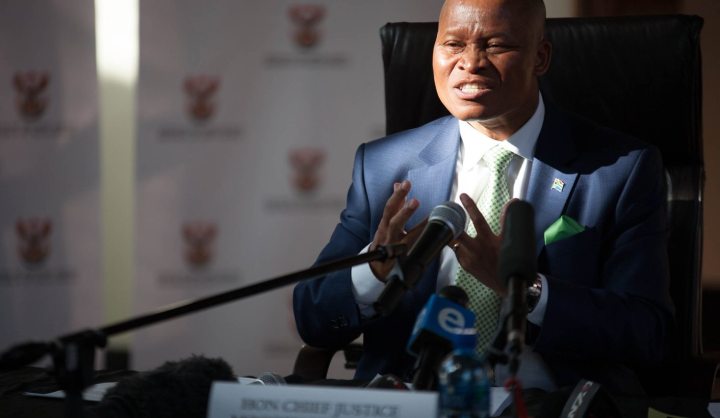Africa
Chief Justice Mogoeng Mogoeng: ‘Feel free to mock judges, but don’t threaten us with violence’

People should feel free to criticise judges, but threats are not on, Chief Justice Mogoeng Mogoeng has said. The country’s top judge was in a philosophical mood after representing African judges at the recent African Union summit for the first time. He spoke to CARIEN DU PLESSIS.
Chief Justice Mogoeng Mogoeng looked somewhat lost among all the politicians and officials mulling around outside the Nelson Mandela Plenary Hall at the African Union headquarters at the 30th African Union summit in Addis Ababa on Monday.
It was a waiting game for the presidents inside the hall to finish their deliberations, eventually, three hours late.
So far there has been little space for the judicial arm of government to make its voice heard on the continent. For the executive, there is the AU summit, for members of the legislature there is the Pan African Parliament, but there’s no similar body for judges, he said.
Mogoeng was invited in his capacity as chair of the Conference of Constitutional Jurisdictions in Africa (CCJA) as a special guest to the summit by AU Commission chairperson Moussa Faki Mahamat. It was meant to help him understand better the challenges facing the AU in enforcing the AU Charter on Human and People’s Rights and the strengthening of judiciaries in constitutional democracies, but he was also there to advise the politicians about the worries of judges on the continent.
“One of the issues of great concern to me is attacks, gratuitous attacks on judicial officers and even threats of violence – even though they are somewhat sporadic – on judicial officers,” he said after the summit in an interview in his hotel suite in Addis Ababa’s upmarket Bole area.
The CCJA has stepped in to defuse threats to the judiciary in a couple of countries, including Egypt.
In South Africa the threats are fewer but there has been a lot of criticism levelled against judges in the past. Justice Mogoeng felt this in December when Economic Freedom Fighters leader Julius Malema said it was unacceptable that he should have expressed a dissenting view when fellow judges ruled that the National Assembly failed to hold President Jacob Zuma to account after the Nkandla ruling.
Even some of his fellow judges disagreed with him.
Justice Mogoeng considered their judgment “a textbook case of judicial overreach”.
Mogoeng, however, said people should have the freedom of speech to criticise judges when they disagree with their viewpoint. Judgments aren’t always popular, he said. “People must feel free to mock at us. When it pains, you must expect a reaction and allow people to vent their anger, because it’s painful to be spoken ill about,” he said.
This even happened in established democracies such as the US judiciary, where presidents have been known to mock judges openly. At other times, he said, a president would praise the judges but the public would criticise them if it was an unpopular decision.
Strong democracies, however, go out of their way to strengthen their court systems. They “recognise the role of the judiciary, however painful its decisions might be”, he said.
One of the major problems in Africa and the world was that governments have not been allowing the judiciary to play its role fully, he said.
Justice Mogoeng said some progress was being made in Africa in strengthening judiciaries, and things were moving in the right direction, “but there is still a lot to be done and progress to be made”.
Justice Mogoeng said he wanted to bring issues such as violence and threats against the judiciary to the AU. If governments wanted the judiciary to play a role in uprooting corruption, “they must be alive to the critical challenges that confront the judiciaries in the continent”, he said.
The theme of this year’s summit was “winning the war against corruption”. Nigerian president Muhammadu Buhari, who is the champion of this theme, said criminal justice systems across the continent had to be strengthened as part of the fight against corruption.
“We have a brighter tomorrow in Africa if we all buy into what needs to be done, and do it,” he said. Part of the problem is that there’s sometimes too much talk.
He also said “a more brutal continental introspection needs to be happening”.
Justice Mogoeng said judges were often left out of spaces where politicians are making decisions, and they shouldn’t be.
“I’ve learnt a lot, and I’m better positioned to continue meaningfully in shaping the judiciaries and also help to define our engagement with the AU better,” he said. Of the AU summit, he simply said: “I’m happy to be here.” DM
Photo: Chief Justice Mogoeng Mogoeng (A file photo by Greg Nicolson)

















 Become an Insider
Become an Insider